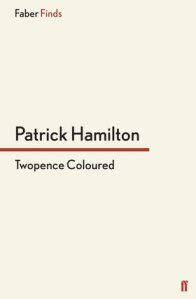 Finds has a brand new skin for its July titles, forthcoming this week and offering a refreshed range of subject matter along with a handsome redesign of the imprint’s covers (and dedicated copy for each title.) Fictional treasures amid the July selections include Stranger With a Bag, short stories by Sylvia Townsend Warner, hailed by Sarah Waters as ‘one of the most talented and well-respected British authors of the twentieth century’; Emma Tennant’s feminist gothic tales Faustine and Two Women of London; and the incredibly rare early Patrick Hamilton novel Twopence Coloured. Among the non-fiction offerings are Trevor Wilson’s timely The Downfall of the Liberal Party 1914-1935; Correlli Barnett’s The Audit of War, anatomising Britain’s decline as a world power; and Tom Wintringham’s searing Spanish Civil War memoir English Captain (on the 75th anniversary of the generals’ coup.) Pop culture also makes its presence felt on the Finds list through two seminal works of the mid-1980s: Dave Rimmer’s Like Punk Never Happened: Culture Club and the New Pop, and Fred Vermorel’s brilliantly lubricious Starlust: The Secret Fantasies of Fans. And the literary dimensions of football are represented by Gazza Agonistes, a terribly funny and deeply felt appreciation of Paul Gascoigne by the late poet and Spurs fan Ian Hamilton. The list is completed by memoirs from two of the great neglected geniuses of twentieth century English letters: Maiden Voyage by Denton Welch and Apostate by Forrest Reid. In the week ahead please do look out for more on this page for each of these brilliant titles.
Finds has a brand new skin for its July titles, forthcoming this week and offering a refreshed range of subject matter along with a handsome redesign of the imprint’s covers (and dedicated copy for each title.) Fictional treasures amid the July selections include Stranger With a Bag, short stories by Sylvia Townsend Warner, hailed by Sarah Waters as ‘one of the most talented and well-respected British authors of the twentieth century’; Emma Tennant’s feminist gothic tales Faustine and Two Women of London; and the incredibly rare early Patrick Hamilton novel Twopence Coloured. Among the non-fiction offerings are Trevor Wilson’s timely The Downfall of the Liberal Party 1914-1935; Correlli Barnett’s The Audit of War, anatomising Britain’s decline as a world power; and Tom Wintringham’s searing Spanish Civil War memoir English Captain (on the 75th anniversary of the generals’ coup.) Pop culture also makes its presence felt on the Finds list through two seminal works of the mid-1980s: Dave Rimmer’s Like Punk Never Happened: Culture Club and the New Pop, and Fred Vermorel’s brilliantly lubricious Starlust: The Secret Fantasies of Fans. And the literary dimensions of football are represented by Gazza Agonistes, a terribly funny and deeply felt appreciation of Paul Gascoigne by the late poet and Spurs fan Ian Hamilton. The list is completed by memoirs from two of the great neglected geniuses of twentieth century English letters: Maiden Voyage by Denton Welch and Apostate by Forrest Reid. In the week ahead please do look out for more on this page for each of these brilliant titles.
Posts Tagged ‘ian hamilton’
J.D. Salinger’s private passions
Posted in Uncategorized, tagged catcher in the rye (salinger), chris bigsby, christopher hitchens, faber finds, ian hamilton, in search of j.d. salinger (hamilton), j.d. salinger, richard t kelly, tim henman, UEA on 27/01/2011| Leave a Comment »
The estate of Donald Hartog, a long-time friend of The Catcher in the Rye author, has given 50 of [J.D.] Salinger’s letters and four postcards to the University of East Anglia’s (UEA’s) literary archives…
Salinger and Hartog met in 1937 in Vienna when they were both 18, after being sent to Europe by their fathers to learn German… During the Second World War, the pair continued to correspond. While letters from this period have been lost, in 1986 Hartog revived their friendship. This was prompted by media reports that an unauthorised biography about the writer, In Search of JD Salinger: A Writing Life (1935-65), by British author Ian Hamilton, was due to be printed…
[Salinger] initially tried to stop the publication of Hamilton’s biography, but the book eventually appeared in 1988 in paraphrased form.
Indeed it did, and since 2010 the superb In Search of J.D. Salinger has been available in Faber Finds. What, then, does the unearthed correspondence tell us of the author of The Catcher in the Rye? Well…
In the letters, the media-shy author discusses his keen passion for sports. [UEA Professor of American Studies Chris] Bigsby says: “He is personable, he is chit-chatty. During a series of letters in the late 1980s and early 1990s the two correspondents share an interest in Tim Henman. Salinger remarked that he liked the look of Henman’s parents, who were appearing on TV a lot at the time, mentioning that they didn’t look like your average pushy sports stars’ parents.”
For a writer who penned one of the most critically-adored works in history, Salinger’s preoccupations are strikingly ordinary, if eccentric. His favourite of The Three Tenors was José Carreras. He enjoyed watching television, including Granada Television’s Band of Gold and the 1990 Fifa World Cup. In 1996, he sent Hartog clippings about the OJ Simpson trial. He talks approvingly of Mikhail Gorbachev’s election as president of the Soviet Union in 1990, while remarking during the 1988 US presidential elections that he “had no hope” for incoming leader George HW Bush…
The following tribute to Catcher from Christopher Hitchens describes a surely-not-atypical sense of literary discovery and, for me, says most of what needs saying about the book’s enduring appeal. One wonders how future generations will feel about it, and indeed about the USA?
